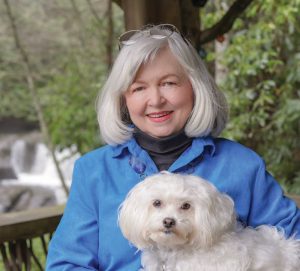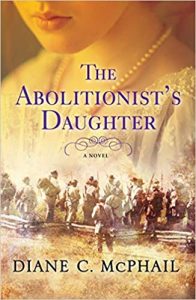Interview with Diane C. McPhail, author of THE ABOLITIONIST’S DAUGHTER
Based on true events and rooted in family history, Diane C. McPhail’s debut novel upends stereotypes of the Civil War South with a rare depiction of Southern Abolitionism and the experiences of three astonishing women.
We are delighted to feature this interview with her!
 Q: Tell us a little about the background of THE ABOLITIONIST’S DAUGHTER.
Q: Tell us a little about the background of THE ABOLITIONIST’S DAUGHTER.
A: I grew up with the story that forms the core narrative of The Abolitionist’s Daughter, a story well-known in Webster County, Mississippi. I remember my aunt taking me to see the “ghost town” of Greensboro when I was about five – and I also remember how disappointed I was to find only an abandoned graveyard. The story haunted me.
When I became a therapist, it haunted me even more; I asked questions as to how people arrive at such violence and, in the aftermath, how survivors manage to go on. I was reading some old news articles about the incident when my uncle revealed that the woman at the center of this tragedy was my great-grandmother
. No one had ever connected the story to my family. It was then that I became truly engaged with the narrative. I discovered the untold history of how my great-grandmother’s father, the Judge, tried to free his slaves. Though educating slaves was illegal, he colluded with his children’s tutor to set up a slave school to prepare them for the freedom he believed was inevitable. I discovered an entire dimension of Mississippi history that gets little exposure.
Q: How did you decide to write this book?
A: Because I am a therapist, this story haunted me on two levels. First I was intrigued at how people arrive at committing such violence and then in the aftermath, how survivors manage to go on with life, bearing the trauma. The stereotypical qualities of oral history passed down through generations lead to very simplified stories of good vs. bad, with motivations explained in very simple terms, like “land greed.” Life and people are never so simple. The best of us have flaws and the most flawed of us have at least some virtues. I began writing to explore what the more realistic and complex story might have been, how these people might have lived as authentic human beings.
Q: How much research went into writing this book and where did that research lead you? Was there anything that particularly surprised you?
A: I spent twelve years researching and writing The Abolitionist’s Daughter. The research and writing occurred more or less simultaneously. I am not an outline-oriented writer. I am more inspired by using random scenes as they occur to me to explore characters and the dynamics between them. So the writing inspired the research and research inspired the writing. I was shocked to find in the later years of slavery that it had been illegal to free slaves.
A great deal is known about The Underground Railroad, but very little about Southern antislavery efforts to prevent family separations or to use the purchase of slaves to rescue them from dire circumstances. There was one aspect of the research that came as a total surprise. I was going back through the manuscript and came upon a scene based on drought. Suddenly I wondered if that could be too far from actual history. To my amazement, I discovered that The Civil War broke out at the end of the Little Ice Age, with violent extremes of unseasonable and unpredictable weather as the result of global warming. Those extremes turned out to be one of the major factors in the war on both sides and in civilian life.
Q: What is important to you about historical fiction? How do you differentiate actual history and fiction?
A: There are all types of novels that fall under the general heading of historical fiction, from highly researched almost biographies to romance novels set in a historic era. I’m not a great reader of history textbooks. But I love a good story, especially based on actual history. And most especially a good story that addresses issues crucial to any age. Good historical fiction, for me, should address not only the historical context, but the deep and crucial issues that continue to face human beings throughout the ages.
My novel depicts very little-known aspects of Southern antislavery, specifically that after about1850, manumission or the freeing of slaves was made illegal. For about twenty years prior to that, it could only be granted for single slaves by vote of the state legislature. Very few people know that it was a crime to free slaves. It was also a crime to teach them to read and write. The character Judge Matthews, based on the life and murder of an actual person, is faced with how to do whatever is in his power to prepare his slaves for the freedom he believes to be inevitable, even if he himself is powerless to grant it. His daughter Emily is left to learn to carry on his intentions, learn to farm, take leadership, and adjust to grief and difficulty.
Although thoroughly grounded in actual events, The Abolitionist’s Daughter, is fiction. It uses history as a framework to explore character, relationships, motivations, and all sorts of human complexities to which I have no historical access, but of which I have experienced human knowledge.
Q: What would you say is most important about your novel?
A: What an interesting question. The fundamental question underlying the book is this: what do you do when the good you know to do is impossible? The impediments might be cultural, legal, familial, systemic, financial—any number of reasons. In the Judge’s and his daughter’s case it was a crime.
That question is the foundation for the story. And then, of course, there is the story! The story of a young woman, innocent and protected, faced with unthinkable personal violence and tragedy, her story a microcosm of the grief and trauma faced by multitudes of women during The Civil War, the bloodiest war our country has fought. Historical fiction is best when its primary themes are current and timely. Quandaries of the moral and legal are as immediate as our own lives. The issues I explore in The Abolitionist’s Daughter are as current as our daily headlines.
Q: What has been the reaction among your readers? How have those reactions made you feel? Have you been surprised perhaps?
A: Most writers I know have a certain anxiety as to how their work will be received and that is certainly true for me. The primary flow of reader response has been very favorable. Of course, there are also those who say “this is not for me.” At first those disturbed me somewhat, but then I was advised to look up books I knew to be great and read the responses. That helped my laugh and feel that I was, indeed, in good company, though I would prefer to reach those readers—but it is clear not even the greatest authors reach everyone.
The greatest surprise for me has been from readers who described the book as a page-turner. That was not my intention, but I’m so excited to hear that readers, men and women, “could not put it down.” People tell me repeatedly that they read the book in two days and stayed up all night to finish it. One posted that it was my fault they had to order dinner out and didn’t get the laundry done. The strongest responses I have had to the book have come from men. They are astounded at the research and at the knowledge of farm life. Their intense enthusiasm delights me.
Perhaps the thing that touches me most deeply are the interactions with those who respond to the deeper universal issues beneath the story of the book. When readers reach out to me to discuss those issues of human experience at every level and in any age, I feel I have succeeded in a way that cannot be measured.
—
Diane C. McPhail is an artist, writer, and minister. In addition to holding an M.F.A., an M.A., and D.Min., she has studied at the University of Iowa distance learning and the Yale Writers’ Workshop, among others. Diane is a member of North Carolina Writers’ Network and the Historical Novel Society. She lives in Highlands, North Carolina, with her husband, and her dog, Pepper.
Find out more about her on her website https://www.dianemcphailauthor.com/
 On a Mississippi morning in 1859, Emily Matthews begs her father to save a slave, Nathan, about to be auctioned away from his family. Judge Matthews is an abolitionist who runs an illegal school for his slaves, hoping to eventually set them free. One, a woman named Ginny, has become Emily’s companion and often her conscience—and understands all too well the hazards an educated slave must face. Yet even Ginny could not predict the tangled, tragic string of events set in motion as Nathan’s family arrives at the Matthews farm.
On a Mississippi morning in 1859, Emily Matthews begs her father to save a slave, Nathan, about to be auctioned away from his family. Judge Matthews is an abolitionist who runs an illegal school for his slaves, hoping to eventually set them free. One, a woman named Ginny, has become Emily’s companion and often her conscience—and understands all too well the hazards an educated slave must face. Yet even Ginny could not predict the tangled, tragic string of events set in motion as Nathan’s family arrives at the Matthews farm.
A young doctor, Charles Slate, tends to injured Nathan and begins to court Emily, finally persuading her to become his wife. But their union is disrupted by a fatal clash and a lie that will tear two families apart. As Civil War erupts, Emily, Ginny, and Emily’s stoic mother-in-law, Adeline, each face devastating losses. Emily—sheltered all her life—is especially unprepared for the hardships to come. Struggling to survive in this raw, shifting new world, Emily will discover untapped inner strength, an unlikely love, and the courage to confront deep, painful truths.
In the tradition of Cold Mountain, The Abolitionist’s Daughter eschews stereotypes of the Civil War South, instead weaving an intricate and unforgettable story of survival, loyalty, hope, and redemption.
Category: Interviews, On Writing
























